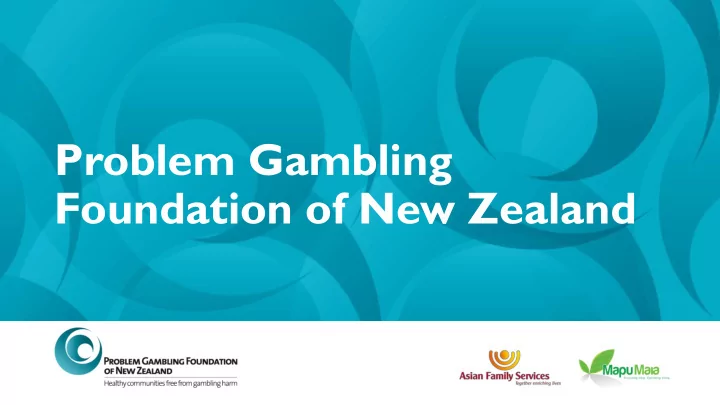

Problem Gambling Foundation of New Zealand
Research and Evaluation of Services Best Practice Laurie Siegel-Woodward Problem Gambling Foundation of New Zealand
What do we want to know? • Does our service work? • Are consumers able to easily access our service? • Are clients improving? • How much are they improving? • What are we doing that is helping (are they even improving because of us)? • What can we do better? • How can we keep clients from getting worse or disappearing?
What do we already know? • Consumer input is not only required by District Health Boards, but it is the obvious way to find out how and why our services work (or don’t). • 1000s clinical trials dating back from the 1950’s have demonstrated that the relationship/alliance between the counsellor and the client is more predictive of success than any expertise the counsellor holds. This includes model, training, culture, etc. • Success is hard to define. Gambling $200/wk might be a positive outcome for some. Saving a marriage if it’s abusive may be a negative thing.
Factors Accounting for Successful Outcomes 40.0% Client/Extratherapeutic 15.0% 30.0% Model and Techniques Relationship 15.0% Placebo, Hope, and Expectancy Lambert, M. (1986). Implications of Psychotherapy Outcome Research for Eclectic Psychotherapy. In J. Norcross (Ed.) Handbook of Eclectic Psychotherapy. New York: Brunner/Mazel.
Partners for Change Outcome Management System • Systematically recaptures clients at risk of not improving • Supported by 5 randomised clinical trials • A proven quality improvement strategy • Enhances the factors related to success • Incorporates the known predictors of success (early change and the alliance) • Operationalises client privilege and social justice (makes consumers the decision-makers).
How do we use it at PGF? • Quality assurance • Quantitative measurement (compared to a baseline) from the client’s perspective • Absolute consumer feedback • Real-time evaluation • Future interventions are directed by client preference including their culture, ideas, values and theories.
How do we use it to shape our service?
Through the course of interventions • We measure how clients are feeling regarding their reason for service • Each session, their progress is reviewed and evaluated… together • If things are not improving, we discuss that to find out why • At the end of the session, clients are asked to give structured measured feedback on the session. This gives counsellors the chance to adjust their approach to suit the client in the following session • These measures take place in groups, follow-up calls and facilitation sessions.
Follow-ups • Continue to track client outcome according to their reason for service • Obtain feedback on their experience of counselling, the service and its accessibility • Check to see that the client is satisfied with the status of their service • Explore whether PGF might be able to provide any other opportunities for participating constructively within their community.
In Supervision • Graphs are used in supervision so that the client’s voice is brought into the room instead of the counsellor bringing their opinion or impression • Clients who are not progressing are immediately evident and prioritised for discussion • If the client is below the normed cut-off, and not improving as the normed trajectory would suggest it should, changes can be discussed based on the client feedback • If the outcome score doesn’t improve significantly in accordance to expectation, alternatives can be discussed such as a referral to a practitioner with a better fit to the client’s approach.
In Programmes and Presentations • Evaluation forms are collected at the end of each programme or presentation • The Group Rating Scale is used where appropriate in programmes and presentations • Feedback is collated, reported and kept on file in order to make training decisions.
Fidelity and Integrity • Barry Duncan is the co-author of the measures and inventor of the outcome measuring system which is the only one to have randomised clinical trials supporting its efficacy. He is partnering with NZ organisations to create a regulating body that trains, oversees and regulates the use of PCOMS within NZ to ensure its ongoing fidelity and integrity • We are committed to using the measures as they were designed to be used, through participation in and adherence to the guidelines set by Barry Duncan’s NZ PCOMS regulating body • We can then make meaningful conclusions from the data and trends and take advantage of the benefits SAMSA currently experience.
Overall Service – Research • CLIENT-DIRECTED, OUTCOME-INFORMED APPROACH TO PROBLEM GAMBLING INTERVENTIONS: EXAMINATION OF ORS/SRS DATA FOR CLIENTS SEEKING ASSISTANCE FOR GAMBLING PROBLEMS • Authors : • Geoff D. Bridgman [author for correspondence] • Fiona V. Rossen • Funding: This study was funded by the Problem Gambling Foundation of New Zealand and Unitec Institute of Technology.
Overall Service • The Problem Gambling Foundation of New Zealand (PGFNZ) has been recording client data since 2009. • Currently the ClinTech database contains information on more than 17,000 client sessions • The study outlined in the present paper compares data from 4,055 PGFNZ clients who attended the service from 2010 to 2014, against validated benchmarks from ORS/SRS research • While ORS/SRS have been used extensively in mental health and addiction fields, both locally and internationally, these scales have not been used in published studies with problem gambling clients.
Overall Service • Internationally, there is just one published study of a mental health and substance abuse service using ORS • Key findings include that Asian clients show less progress than non-Asian clients • SRS scores suggest that more could be done to enhance therapeutic alliance • Overall, PGFNZ’s outcomes from its problem gambling counselling services meet or exceed benchmarks identified in other research, with particularly strong results being shown for clients in the clinical range for depression – the most unwell group.
Outcome Rating Scale
Child Outcome
Session Rating Scale
Recommend
More recommend